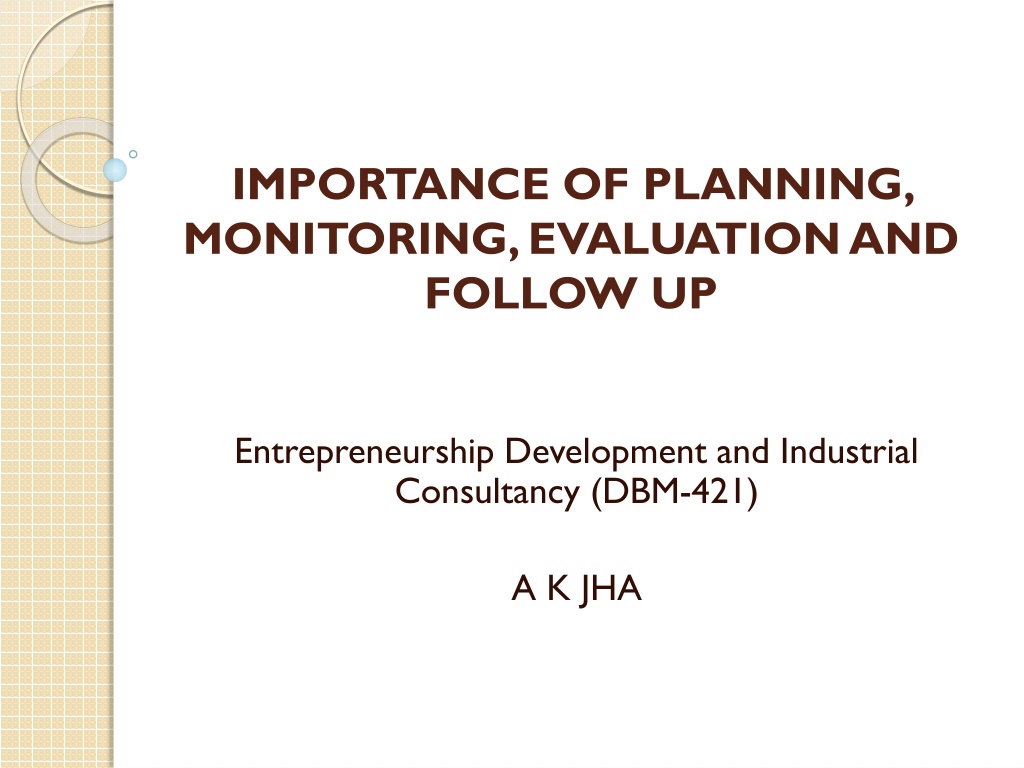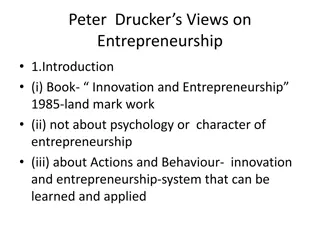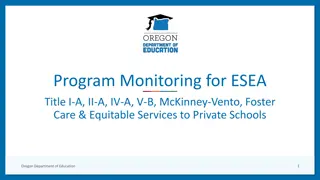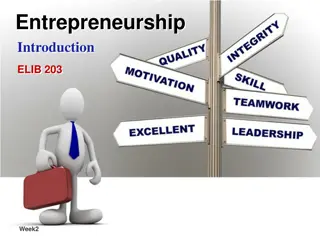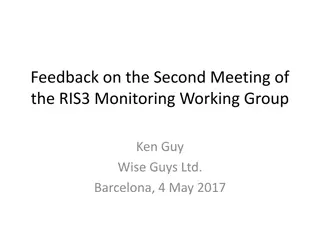Importance of Planning, Monitoring, Evaluation, and Follow-Up in Entrepreneurship Development
Planning, monitoring, evaluation, and follow-up are critical functions in entrepreneurship development. They ensure alignment with goals, prompt corrective actions when needed, and aid in the creation and execution of business plans. Through steps like idea generation, environment assessment, feasibility analysis, project report preparation, and continuous evaluation, entrepreneurs can establish and grow successful enterprises. A well-developed business plan acts as a guiding document, providing a roadmap for the organization's future endeavors and aiding in obtaining financial support.
Download Presentation

Please find below an Image/Link to download the presentation.
The content on the website is provided AS IS for your information and personal use only. It may not be sold, licensed, or shared on other websites without obtaining consent from the author. Download presentation by click this link. If you encounter any issues during the download, it is possible that the publisher has removed the file from their server.
E N D
Presentation Transcript
IMPORTANCE OF PLANNING, MONITORING, EVALUATION AND FOLLOW UP Entrepreneurship Development and Industrial Consultancy (DBM-421) A K JHA
Introduction Planning, monitoring and evaluation (PME), and follow up are the key managerial functions. Once the plan is prepared and implemented, its monitoring and evaluation are essential to see whether the plan is proceeding as per the original plan or there is any deviation. If deviations are found mid-course correction essential to get the desired impact. In case of enterprise, planning is related to business plan activities. measures are
Business Plan A business plan acts as a guide for entrepreneurs. It serves the following main functions: It provides logical and structural overview of the enterprise highlighting the key activities to be carried out in different phases. It provides guidelines to compare ongoing progress. It identifies the key resources (man power, machines, time etc.) required at different stages of growth of enterprise. It helps in participative management as all the employees are aware about future activities. It provides an authentic document for communicating aspects of enterprise with financers, government and other stakeholders.
Steps in Business Planning Process Idea generation:This is the first preliminary stage of business planning process. Assessing the environment: It is necessary to analyze both macro (external) and micro (internal) environments to know strength, weakness, opportunities and threats faced by the organization/entrepreneur. Feasibility analysis: On finding the environment suitable for the enterprise,detailed feasibility study is to be carried out viz., market feasibility, technical/ operational feasibility and financial feasibility. Project report preparation: Using the information so far collected, a project report/ business plan is prepared. A business plan is a written document describing step by step strategies to establish and operate an enterprise. Evaluation, control & review: In order to retain leading position in today s competitive business world, it is necessary for an enterprise to continuously evaluate the functioning and do necessary revisions in the light of changed circumstances. 1. 2. 3. 4. 5.
Developing a Business Plan A business plan is an important step in establishing any new enterprise. It acts as a roadmap to guide the future of the enterprise and provide direction for expansion,diversification and evaluation of the enterprise. Format of Business Plan The business plan should be professional so that enterprise is portrayed in a positive manner.Financial assistance is obtained based upon business plan. A business plan should include executive summary, mission statement, goods and objectives, back ground information, organizational matters, marketing plan and financial plan. Executive Summary It describes the business or proposed changes to the existing business and category of industry to which the business / enterprise belongs. It outlines the direction and future plans or goods of the company,the methods to be employed to achieve the goals. It also describes challenges that will be faced by the enterprise / business.
Mission,goals and objectives The mission statement should be short should give the key idea or reasons for existence of enterprise. Goals and objective should show what the business wishes to accomplish and the steps needed to obtain the desired results. Goals and objectives should be specific, measurable, attainable, reasonable and time bound. Background information This covers information about history of the enterprise, the current state of industry in which enterprise fall and information from the reputed sources about future of industry in which enterprise falls
Organizational structure This includes management team, risk management etc. There are different forms of organization structures. The structure selected should be appropriate to the management skills and style of the owners. description about organizational structure, Marketing plan It covers aspects like characteristics and advantages of product of the enterprise, sales location, promotion, advertising, pricing and the associated costs of all market related activities. Financial plan This covers aspects of types of records to be maintained, signing authority for banking transactions, financial assumption etc. Financial projection for at least five years should be indicated.
